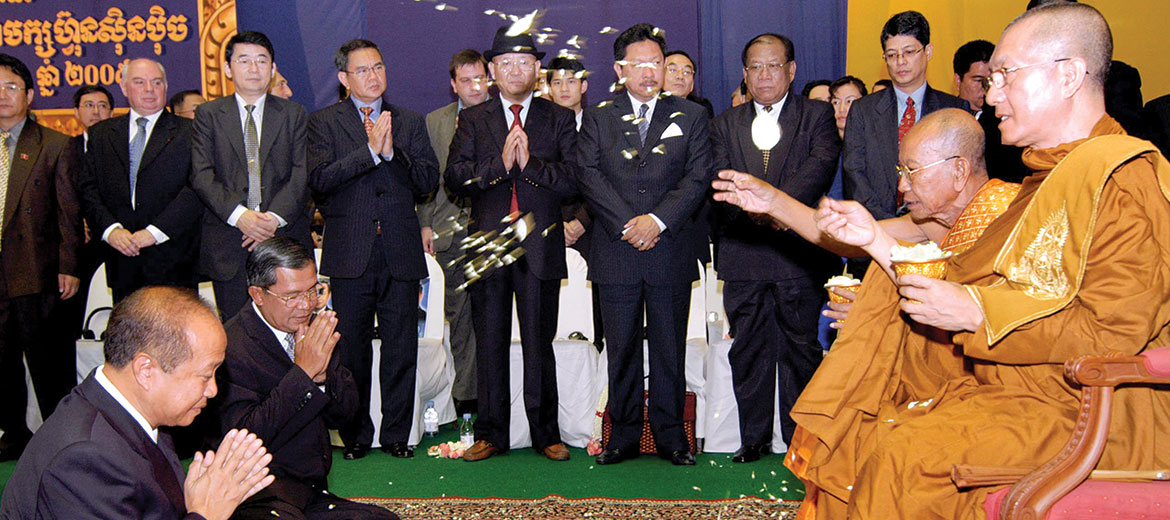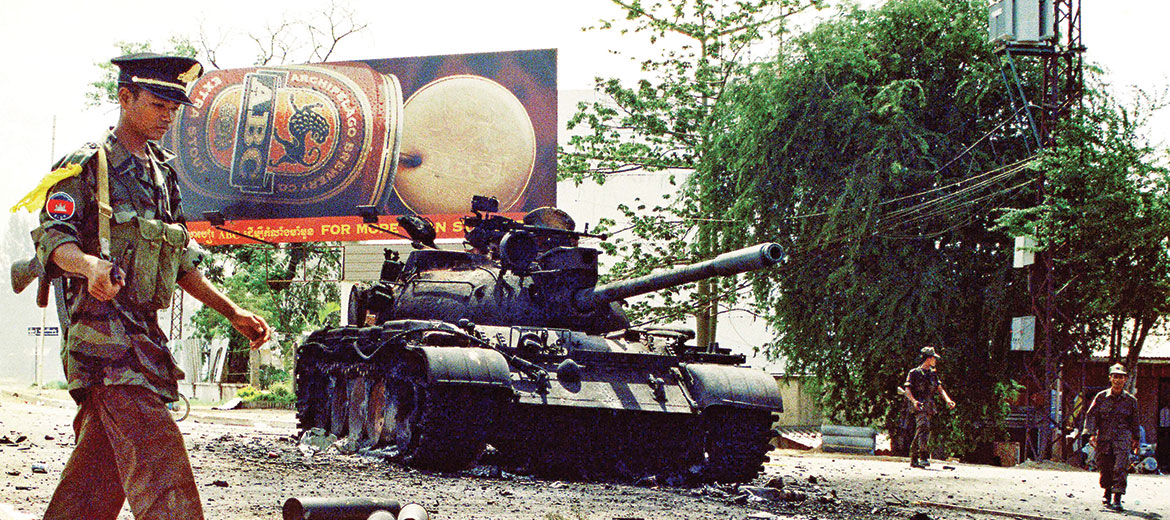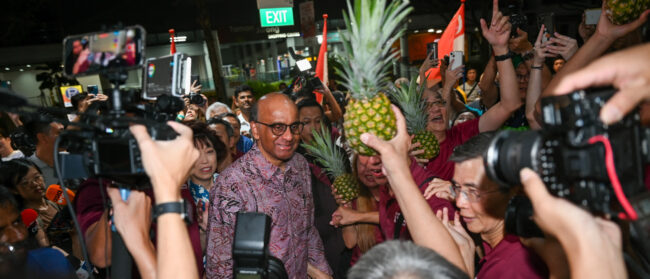Born out of the resistance movement that fought against the Vietnam-backed People’s Republic of Kampuchea, the United Front for an Independent, Neutral, Peaceful and Cooperative Cambodia (better known by its French acronym Funcinpec)’s rise, fall and recent resurgence is a bleak reminder of a time when millions of Cambodians seemed poised to seize control of their own fate – and saw that chance slip through their fingers.
To look at Funcinpec now – a party that won less than 4% of the popular vote in the most recent national election in 2013 – one could almost be forgiven for forgetting that this was the party that soared to victory in the country’s UN-managed elections of 1993, the first time Cambodians had headed to the polls since the Khmer Rouge era. With the exiled Prince Sihanouk recently returned to the Kingdom to preside over the reluctant union of Cambodia’s competing factions – Hun Sen’s Cambodian People’s Party (CPP) and Prince Norodom Ranariddh’s royalist Funcinpec party – hopes were high that the nation could finally free itself from decades of civil war.
But for Astrid Norén-Nilsson, author of Cambodia’s Second Kingdom: Nation, Imagination and Democracy, support for Funcinpec during the 1993 elections always owed more to personality than policy.
“In 1993, it was Sihanouk who won Funcinpec the elections,” she said. “Funcinpec represented the rosy dream of a return to Sihanouk’s ‘Oasis of Peace’ – the last period of peace the country knew before it plunged into more than two decades of civil war. But the leadership of Funcinpec was not up to the task. From the outset, it was enmeshed in rent-seeking activities. There were cleavages and tensions between returning royal family members and veteran resistance fighters, and this resulted in factionalism damaging party cohesion.”
Despite a clear mandate to form a government, Funcinpec found itself fighting to claw political control away from the CPP. After a fraught secession crisis widely believed to have been orchestrated by Hun Sen, power was divided between Funcinpec and the CPP. According to Hun Sen’s Cambodia author Sebastian Strangio, it was an unenviable position for even the most well-oiled political machine.
“The fact that the CPP basically refused to cede power was a huge complicating factor for Ranariddh,” he said. “But even in the early years the impression I got speaking to former diplomats and other Cambodian officials [from that] time was that Ranariddh was ineffectual, vain, difficult to work with – and in some readings of the situation he missed a golden opportunity to capitalise on this mandate that he had been given by the Cambodian people.”
Powerless at best and complicit at worst in Hun Sen’s relentless regime, the royalist party and its president seemed more concerned with establishing its own shadow patronage system than pursuing policies of its own.
“Funcinpec is not what Cambodia needs”
Noan Sereiboth, political blogger
Originally invited to serve as an advisor on women’s affairs, Mu Sochua was elected into the country’s fractured coalition government with Funcinpec in 1998 – just one year after a bloody showdown between the two rivals had seen some of the royalist party’s leaders and military supporters gunned down by forces loyal to Hun Sen and the CPP. But despite putting into place laws against domestic violence and human trafficking that remain today, Sochua sees Funcinpec’s period of power-sharing as a wasted opportunity.
“The prince didn’t have an agenda,” she said. “Funcinpec as a whole didn’t have an agenda – and that’s why it never could push further for anything that Hun Sen or the CPP did not want Funcinpec to push for. Funcinpec had key ministries like the ministries of justice, the interior, education, healthcare. But they didn’t have a good team – the ministers were not qualified, and under pressure and corruption it all crumbled little by little.”
Even among younger Cambodians, it is a legacy of disappointment that has been difficult to shake. Noan Sereiboth, a political blogger, said that the royalist party has little left to offer.
“Funcinpec is not what Cambodia needs,” he said. “We’ve seen their leadership since 1993, but what they’ve achieved for Cambodia has not been much. We’ve seen the difference between what they say and what they do, and how they promise and how they keep their promises to the people – and how they’ve worked with the CPP.”

Ultimately, it is this grasping impotence – and apparent willingness to prioritise power over principle – that seems to have sealed Funcinpec’s fate. Outmanoeuvred and outclassed by the ruthless Hun Sen’s wide-reaching web of patron-client relationships, and struggling to stay in the sidelined Sihanouk’s shrinking spotlight, Ranariddh and his followers soon found themselves struggling to compete with newly formed opposition parties and splinter groups unmarred by the stain of CPP collaboration.
“By the 2008 election they were divided and won just a couple of seats – and I think that was the death knell for Funcinpec”
Sebastian Strangio, author, Hun Sen’s Cambodia
“By the 2008 election they were divided and won just a couple of seats – and I think that was the death knell for Funcinpec,” Strangio said. “The only way that they’re going to get back into politics is by begging for a few crumbs of patronage from the CPP’s table.”
With the main opposition CNRP dissolved and its leadership imprisoned or scattered, those crumbs have finally spilled over. Pledging support to Hun Sen’s call last month to redistribute the CNRP’s National Assembly seats between the remaining minor parties – who between them commanded less than 6% of the popular vote in 2013 – Ranariddh wasted little time in reiterating that Funcinpec posed no threat to Hun Sen’s vision of a Cambodia united under his unchallenged authority.
“Samdech Hun Sen, you want or you don’t want, you like him or you don’t like him, he brings about this national unity,” Ranariddh told Reuters at the time. “According to the law you are not allowed to harm national unity.”
Funcinpec now stands to gain 41 seats in the National Assembly.
Professor of diplomacy and world affairs at Los Angeles’ Occidental College, Sophal Ear was unimpressed by the royalist group’s abrupt return to relevance.
“For the millions of Cambodians who voted for the CNRP, it’s such a slap in the face,” he said. “I mean, how many times did Funcinpec bend over backwards over the years? How many times did it sell its soul? How many souls does a political party have anyway? I guess it’s more like lives, but I’ve stopped counting, and they’re about to have another turn at the trough.”

Sochua described Ranariddh as a saboteur working for the destruction of Cambodia’s fledgling democracy.
“For the prince to dare to say that he is now with Hun Sen – how could he forget the people who were killed?” she asked. “His own soldiers, his own officers, his own colleagues who fought with him in the resistance and who were killed in 1997.”
A spokesperson for Funcinpec did not respond to requests for comment.
Without a majority, it is unlikely that Funcinpec would be able to provide any kind of concerted opposition to the CPP’s agenda even if it wanted to. Norén-Nilsson described its likely role as effectively that of a satellite state to the ruling party.
“In the event that Funcinpec will take over some of the CNRP’s National Assembly seats, the party will act as an extension of the CPP, probably insisting noisily from time to time on how the ceremonial role of the constitutional monarchy has to be safeguarded,” she said. “Ranariddh’s stance is that Funcinpec is not an opposition party – for the ordinary voter, this begs the question of why one should vote for Funcinpec rather than the CPP.”
For Sochua, though, the bitter irony of losing her hard-won seat in the National Assembly to a party that has wasted every chance of widespread reform will not be lost on the millions of Cambodians who voted for change almost five years ago.
“People know who the prince is,” she said. “And anybody from Funcinpec who will take the seats from the CPP should feel that same moral responsibility. I don’t know how they’ll explain that to the people – or how they’ll rest their conscience.”


